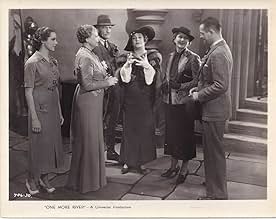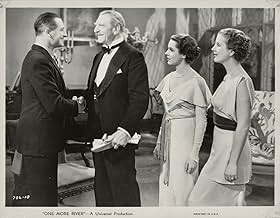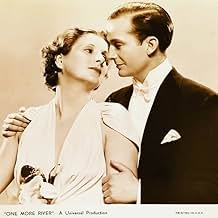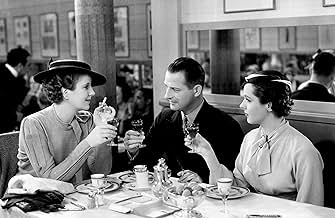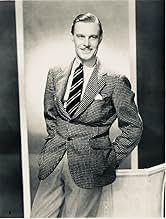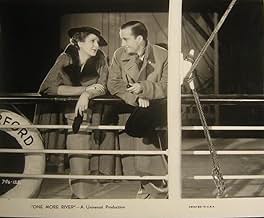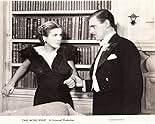अपनी भाषा में प्लॉट जोड़ेंA young lady leaves her brutal husband and meets another man aboard a ship.A young lady leaves her brutal husband and meets another man aboard a ship.A young lady leaves her brutal husband and meets another man aboard a ship.
- निर्देशक
- लेखक
- स्टार
फ़ीचर्ड समीक्षाएं
This is one of Whale's favorites among his own works (the director even gave himself an uncredited bit!) but which he only got Universal to bankroll by accepting to helm another fantasy project for them, the subsequently aborted "A Trip To Mars". Anyway, this obscurely-titled melodrama is based on John Galsworthy (best-known for "The Forsythe Saga")'s last novel – adapted by the equally distinguished R.C. Sheriff. It tells of the vicissitudes of a young wife (Diana Wynyard, fresh from an Oscar nomination for the previous year's Best Picture winner CAVALCADE), about to be divorced from her brutish husband (a brief but typically impressive turn from Whale regular Colin Clive), who unwittingly adds coal to the fire via her initially platonic relationship with a young man (Frank Lawton, soon to play his most notable role as the grown-up David COPPERFIELD [1935]). The narrative also has a strong political element to it, not just in view of the subplot involving the electoral climate (personified by Reginald Denny's newly-appointed MP), but in the heroine's emancipation from the rigid status quo pertaining to woman's role in society.
While undeniably dated, the film boasts splendid cinematography and sets (by BRIDE OF FRANKENSTEIN's John J. Mescall and Charles D. Hall respectively) – the latter would be memorably refurbished and re-used for the Mary Shelley prologue and the Baron's own abode in that very film which rather suggests that the art director/set decorator's craft is not nearly appreciated enough! Apart from this, we get a truly remarkable supporting cast: lovely Jane Wyatt (as Wynyard's kid sister), C. Aubrey Smith (their father), Henry Stephenson (an uncle), the oddly-named Mrs. Patrick Campbell (hamming it up as his outspoken wife – apparently, she was like that in real-life too!), Lionel Atwill (the wily but pompous Prosecutor), Alan Mowbray (the defense counsel), Gilbert Emery (the genial Judge) and E.E. Clive (the other Clive's resourceful private detective).
Finally, the copy I acquired was sourced from an old TV broadcast off the U.K.'s Channel 4: despite a couple of intermissions for publicity spots(!), the quality is surprisingly adequate – much better, in fact, than that for most of the other Whales I have been watching lately.
While undeniably dated, the film boasts splendid cinematography and sets (by BRIDE OF FRANKENSTEIN's John J. Mescall and Charles D. Hall respectively) – the latter would be memorably refurbished and re-used for the Mary Shelley prologue and the Baron's own abode in that very film which rather suggests that the art director/set decorator's craft is not nearly appreciated enough! Apart from this, we get a truly remarkable supporting cast: lovely Jane Wyatt (as Wynyard's kid sister), C. Aubrey Smith (their father), Henry Stephenson (an uncle), the oddly-named Mrs. Patrick Campbell (hamming it up as his outspoken wife – apparently, she was like that in real-life too!), Lionel Atwill (the wily but pompous Prosecutor), Alan Mowbray (the defense counsel), Gilbert Emery (the genial Judge) and E.E. Clive (the other Clive's resourceful private detective).
Finally, the copy I acquired was sourced from an old TV broadcast off the U.K.'s Channel 4: despite a couple of intermissions for publicity spots(!), the quality is surprisingly adequate – much better, in fact, than that for most of the other Whales I have been watching lately.
"One More River" (1934) stars Diana Wynyard, Frank Lawton, Colin Clive as top-liners, but the rest of the cast is stellar! Mrs. Patrick Campbell, C. Aubrey Smith, Jane Wyatt, Reginald Denny, Henry Stephenson, Lionel Atwill, Alan Mowbray, Kathleen Howard, Gilbert Emery, E. E. Clive, and the list just keeps on going. This Universal Studios produced film will have most thinking it was made in England, as most of the stars and even the sets are about as English as can be. Beautifully appointed and directed by James Whale, just after coming off of "The Invisible Man" and just prior to "Bride of Frankenstein", this was more of a diversion for Whale, yet he handles it with major aplomb. Many today will consider the theme of suit for divorce based on adultery rather tame, and this would have had even more of a jolt in 1934 had the Code not just gone into effect, but the finished product still has the ability to hold our attention. Wynyard had just come off of her nomination for Best Actress Oscar for "Cavalcade", but she's much better here, and her quiet, if not elegant, though stolid performance serves the part well. She's matched by the ruthless, somewhat fey, but catty nastiness of her film husband, Colin Clive, in a part that shows he had genuine talent that captured range. Frank Lawton, who passionately loves Wynyard, and who is accused of being the co-respondent in the case against Wynyard, is less well-suited, but effective enough.
Written by John Galsworthy, this was much more potent when first released as a novel, but Whale has whittled the novel down to 88 minutes of film, and he's done it very effectively. The film is talkative, but its pristine presentation still packs a punch. Gorgeous cinematography, good direction, fine acting all around - this is recommended highly actually, though many today will wonder what all the hoopla is about. In effect, the film is now dated, and because it lacks the buzz-buzz of so much activity on screen, the CGI, the crash and bang of today's typical hit, let's say it will play better to those looking for something, not cerebral, but soap-operaish in an old-fashioned way.
Written by John Galsworthy, this was much more potent when first released as a novel, but Whale has whittled the novel down to 88 minutes of film, and he's done it very effectively. The film is talkative, but its pristine presentation still packs a punch. Gorgeous cinematography, good direction, fine acting all around - this is recommended highly actually, though many today will wonder what all the hoopla is about. In effect, the film is now dated, and because it lacks the buzz-buzz of so much activity on screen, the CGI, the crash and bang of today's typical hit, let's say it will play better to those looking for something, not cerebral, but soap-operaish in an old-fashioned way.
James Whale was known for his horror movies, including 1931's "Frankenstein," 1932's "The Old Dark House," and 1933's "The Invisible Man." As a former stage director, Whale harkened back to his live theatre days and tackled a subject that some considered foreboden in August 1934's "One More River," a film released just before his 1935's "The Bride of Frankenstein."
The adaptation of the John Galsworthy 1933's novel of the same name, Whale's "One More River" was the first to aggressively test the new Production Code Administration (PCA), led by Joseph Breen. A movie on a husband's sadism towards his wife in the middle of an abusive marriage could have passed the censors in the Pre-Code era, but was taboo during the Breen reign. Whale and his associates had difficulty getting the jest of Galsworthy's themes passed by the Hays Office that ran the PCA. But Whale subtly unfolded "One More River's" more unsavory moments that can be picked up by the observant viewer. Clare (Diana Wynyard) had decided to leave her abusive husband, Sir Gerald Corven (Colin Clive), and her home in Sri Lanka. On the way back to England on an ocean liner, Clare meets a sympathetic young man, Tony Croom (Frank Lawton). Her jealous husband discovers the platonic relationship between the two and tries to get even with her in a highly-publicized domestic trial.
Film historian William Everson labeled "One River More" Whale's masterpiece. "It is by far Hollywood's most successful attempt at putting any subject of England on the screen, not even excepting Cavalcade," he wrote. "It represents the fullest flowering of Whale's unique, richly theatrical yet wholly cinematic style."
Universal Pictures persuaded England's superstar lady of the stage, Mrs. Patrick Campbell, to play Lady Mont, a friend of Clare's, in one of her a handful of movies she appeared. Playwright George Bernard Shaw was a huge fan of Mrs. Campbell, and was so inspired by her acting he based a number of his plays on her. One work was Eliza Doolittle in his 1913 "Pygmalion," later remade into the stage musical and movie "My Fair Lady." Even though she was married, the two had a close friendship, which, judging by the letters he wrote to her, Shaw wanted their relationship to be even closer. Campbell, by all accounts, wasn't exactly enamored about being on the screen. The actress quipped about love making being shown to all by famously saying, "My dear, I don't care what they do, so long as they don't do it in the street and frighten the horses." Mrs. Campbell first arrived on the set requesting from Whales, "I would like to look like a woman called '(Greta) Garbo." When she saw her character on the screen, she retorted, "I look like a little chest of drawers."
"One More River" is also known as Jane Wyatt's film debut. The New Jersey-born and Manhattan-raised daughter of an investment banker, Wyatt possessed a love for the stage, attending apprentice school at the Berkshire Playhouse in Stockbridge, Massachusetts. Wyatt easily made the transition from the Broadway stage to Hollywood as Dinny Charwell, sister of Clare. Famous for her appearances in films such as Frank Capra's 1937 "Lost Horizon" and 1947's "Gentleman's Agreement," she ran into a buzzsaw during the McCarthy hearings with her outspoken defense of the senator's targets. She is most remembered as Margaret Anderson in television's 'Father Knows Best' series.
"One More River" was a mediocre performer at the box office and has since been relegated just to those studying director Whale's body of work. But as historian William Everson noted, "Perhaps more than any other film currently available, it deserves 'Rediscovery.' "
The adaptation of the John Galsworthy 1933's novel of the same name, Whale's "One More River" was the first to aggressively test the new Production Code Administration (PCA), led by Joseph Breen. A movie on a husband's sadism towards his wife in the middle of an abusive marriage could have passed the censors in the Pre-Code era, but was taboo during the Breen reign. Whale and his associates had difficulty getting the jest of Galsworthy's themes passed by the Hays Office that ran the PCA. But Whale subtly unfolded "One More River's" more unsavory moments that can be picked up by the observant viewer. Clare (Diana Wynyard) had decided to leave her abusive husband, Sir Gerald Corven (Colin Clive), and her home in Sri Lanka. On the way back to England on an ocean liner, Clare meets a sympathetic young man, Tony Croom (Frank Lawton). Her jealous husband discovers the platonic relationship between the two and tries to get even with her in a highly-publicized domestic trial.
Film historian William Everson labeled "One River More" Whale's masterpiece. "It is by far Hollywood's most successful attempt at putting any subject of England on the screen, not even excepting Cavalcade," he wrote. "It represents the fullest flowering of Whale's unique, richly theatrical yet wholly cinematic style."
Universal Pictures persuaded England's superstar lady of the stage, Mrs. Patrick Campbell, to play Lady Mont, a friend of Clare's, in one of her a handful of movies she appeared. Playwright George Bernard Shaw was a huge fan of Mrs. Campbell, and was so inspired by her acting he based a number of his plays on her. One work was Eliza Doolittle in his 1913 "Pygmalion," later remade into the stage musical and movie "My Fair Lady." Even though she was married, the two had a close friendship, which, judging by the letters he wrote to her, Shaw wanted their relationship to be even closer. Campbell, by all accounts, wasn't exactly enamored about being on the screen. The actress quipped about love making being shown to all by famously saying, "My dear, I don't care what they do, so long as they don't do it in the street and frighten the horses." Mrs. Campbell first arrived on the set requesting from Whales, "I would like to look like a woman called '(Greta) Garbo." When she saw her character on the screen, she retorted, "I look like a little chest of drawers."
"One More River" is also known as Jane Wyatt's film debut. The New Jersey-born and Manhattan-raised daughter of an investment banker, Wyatt possessed a love for the stage, attending apprentice school at the Berkshire Playhouse in Stockbridge, Massachusetts. Wyatt easily made the transition from the Broadway stage to Hollywood as Dinny Charwell, sister of Clare. Famous for her appearances in films such as Frank Capra's 1937 "Lost Horizon" and 1947's "Gentleman's Agreement," she ran into a buzzsaw during the McCarthy hearings with her outspoken defense of the senator's targets. She is most remembered as Margaret Anderson in television's 'Father Knows Best' series.
"One More River" was a mediocre performer at the box office and has since been relegated just to those studying director Whale's body of work. But as historian William Everson noted, "Perhaps more than any other film currently available, it deserves 'Rediscovery.' "
One More River (1934)
*** (out of 4)
This James Whale directed melodrama is technically good and the performances are fine but I'd still rank it rather low in regards to the director's filmmography. A woman (Diana Wynyard) goes to England to try and escape her abusive husband (Colin Clive) and on the ship ride over has a nice man (Frank Lawton) fall in love with her. Even though her husband is abusive, she refuses to go any further with the new man and it doesn't take long for the husband to show up and cause trouble. ONE MORE RIVER was based on a very popular novel that of course had to be trimmed down for the big screen due to the production code going into full swing during this period. For the most part I thought the film featured some very good performances from its excellent cast and there's no question that it's rather impressive on a technical side. The biggest issue I had with the film was actually the pacing, which just seemed extremely slow to me and it really took forever for the film to finally pick up some speed. There's no question that the material is old-fashioned but this isn't the reason it goes so slow. Again, the best thing going are the performances with Wynyard really standing out as the abused woman trying to do what's right. Lawton is also good in his role as the man who loves her and Clive proves what a talent he was in just a few scenes. Jane Wyatt appears in his first role and we get good support from Reginald Denny, Henry Stephenson, Lionel Atwill and C. Aubrey Smith.
*** (out of 4)
This James Whale directed melodrama is technically good and the performances are fine but I'd still rank it rather low in regards to the director's filmmography. A woman (Diana Wynyard) goes to England to try and escape her abusive husband (Colin Clive) and on the ship ride over has a nice man (Frank Lawton) fall in love with her. Even though her husband is abusive, she refuses to go any further with the new man and it doesn't take long for the husband to show up and cause trouble. ONE MORE RIVER was based on a very popular novel that of course had to be trimmed down for the big screen due to the production code going into full swing during this period. For the most part I thought the film featured some very good performances from its excellent cast and there's no question that it's rather impressive on a technical side. The biggest issue I had with the film was actually the pacing, which just seemed extremely slow to me and it really took forever for the film to finally pick up some speed. There's no question that the material is old-fashioned but this isn't the reason it goes so slow. Again, the best thing going are the performances with Wynyard really standing out as the abused woman trying to do what's right. Lawton is also good in his role as the man who loves her and Clive proves what a talent he was in just a few scenes. Jane Wyatt appears in his first role and we get good support from Reginald Denny, Henry Stephenson, Lionel Atwill and C. Aubrey Smith.
"Claire" (Diana Winyard) is married to aspiring politician "Sir Gerald" (Colin Clive) but he's a bit of a brute. It's an incident with a riding crop that finally sends his wife on a cruise where she encounters "Croom" (Frank Lawton). Unfortunately, her husband cannot be seen to not have his wife at his side and so when she flatly refuses a reconciliation, he sets in motion a public divorce that will call the integrity of not just her, but of her new companion into question. Of course, though still entirely platonic, we know that the relationship between the two has burgeoned somewhat - but this isn't really a film about a romance. It's a rather sad indictment of a judicial system that still looked upon a woman as the property of her husband. Not in a feudal sense, but that she might accuse such a prominent and respectable man of ill-treating her was a charge that was always going to fall on deaf ears. It's the ensuing court hearing that brings this to life a bit, with some sparky sparring from lawyers "Brough" (Lionel Atwill), "Forsythe" (Alan Mowbray) and the inquisitive judge (Gilbert Emery) quite cleverly showcasing the one-sidedness of the whole affair. The film also befits from a great cast of supporting favourites who feature sparingly but add depth to a story of state-supported prejudice that Winyard holds together quite well.
क्या आपको पता है
- ट्रिवियाAccording to Jane Wyatt, "[James Whale] was crazy about Mrs. Pat [Mrs. Patrick Campbell]. The set was kind of run for her. The whole thing was to get her relaxed. She was playing up a lot about how nervous she was, and I think she got an awful lot of attention that way. i think we felt sorry for Mrs. Campbell. Poor dear--how ever are they going to pull her together. That was my reaction. We all had to pull her together and help her through.
- गूफ़In the opening scene, the liner pulling into the London dock that lady Corven arrives on is seen in the establishing shot is clearly named the ORFORD, yet after a we see her and Tony speak on the deck, another establishing shot of the ship now shows it is one called the ORSOVA.
- कनेक्शनReferenced in Gods and Monsters (1998)
टॉप पसंद
रेटिंग देने के लिए साइन-इन करें और वैयक्तिकृत सुझावों के लिए वॉचलिस्ट करें
विवरण
- चलने की अवधि1 घंटा 28 मिनट
- रंग
- पक्ष अनुपात
- 1.37 : 1
इस पेज में योगदान दें
किसी बदलाव का सुझाव दें या अनुपलब्ध कॉन्टेंट जोड़ें


